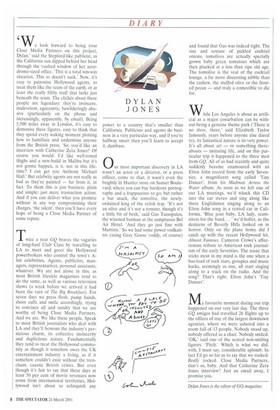W c look forward to being your Close Media Partners
on this project, Dylan,' said the Stepford-like publicist, as the California sun dipped behind her head through the vaulted window of her aerodrome-sized office. This is a total win-win situation. This so doesn't suck.' Now, it's easy to patronise Hollywood agents, to treat them like the scum of the earth, or at least the really filthy stuff that lurks just beneath the scum. The clichés about these people are legendary: they're insincere, malevolent, egocentric, bewilderingly abusive (particularly on the phone and increasingly, apparently, by email). Being 5,500 miles away in London, it's easy to demonise these figures, easy to think that they spend every waking moment plotting how to humiliate and undermine anyone from the British press. `So, you'd like an interview with Catherine Zeta Jones? Of course you would. I'd like well-toned thighs and a new-build in Malibu but it's not gonna happen, is it, not in this lifetime? I can get you Anthony Michael Hall.' But celebrity agents are not really as bad as they're painted — far from it, in fact. To them this is just business, plain and simple; just mere transaction action. And if you can deliver what you promise without in any way compromising their charges, 'the talent', then you'll have every hope of being a Close Media Partner of some repute.
Twice a year GQ braves the vagaries of long-haul Club Class by travelling to LA to meet and greet the Hollywood powerbrokers who control the town's Alist celebrities. Agents, publicists, managers, representatives, personal assistants, whatever. We are not alone in this, as most British lifestyle magazines tend to do the same, as well as various television shows (a week before we arrived it had been the turn of The Big Breakfast). For seven days we press flesh, pump hands. shoot cuffs and smile accordingly, trying to convince all and sundry that we are worthy of being Close Media Partners. And we are. We like these people. Speak to most British journalists who deal with LA and they'll bemoan the industry's pernicious charm, its collective insincerity and duplicitous nature. Fundamentally they tend to treat the Hollywood community as though it somehow owes the UK entertainment industry a living, as if it somehow couldn't exist without the trenchant, caustic British critics. But even though it's fair to say that these days at least 50 per cent of movie revenues now come from international territories, Hollywood isn't about to relinquish any
power to a country that's smaller than California. Publicists and agents do business in a very particular way, and if you're halfway smart then you'll learn to accept it, dumbass.
0 ur most important discovery in LA wasn't an actor or a director, or a press officer, come to that; it wasn't even the brightly lit Hustler store on Sunset Boulevard, where you can buy hardcore pornography and a frappaccino to go; but rather a bar snack, the tomolive, the newlyordained king of the relish tray. 'It's not an olive and it's not a tomato, though it's a little bit of both,' said Gus Tassopulos, the wizened barman at the sumptuous Bel Air Hotel. 'And they go just fine with Martinis.' So we had some power vodkatinis (using Grey Goose voddy, of course)
and found that Gus was indeed right. The size and texture of pickled cocktail onions, tomolives are actually specially grown baby green tomatoes which are then plucked at a less than ripe old age. The tomolive is the veal of the cocktail lounge, a far more discerning nibble than the cashew, the stuffed olive or the frosted pecan — and truly a comestible to die for.
While Los Angeles is about as artificial as a major conurbation can be without being a genuine theme park (`There is no there, there,' said Elizabeth Taylor famously, years before anyone else dared to), its fantastical nature is its very power. It's all about art — or something thereabouts — imitating life, and on this particular trip it happened to the three men from GQ. All of us had recently and quite suddenly become enamoured with an Elton John record from the early Seventies, a magnificent song called 'Tiny Dancer', from his Madman Across the Water album. As soon as we left one of our LA meetings, we'd whack this CD into the car stereo and sing along like three Englishmen singing along to an Elton John song in a rented car in California. 'Blue jean baby, LA lady, seamstress for the band... 'we'd holler, as the denizens of Beverly Hills looked on in horror. Only on the plane home did I catch up with the recent Hollywood hit, Almost Famous, Cameron Crowe's affectionate tribute to American rock journalism of the early Seventies. The scene that sticks most in my mind is the one when a bus-load of rock stars, groupies and music hacks, seemingly as one, all start singing along to a track on the radio. And the song? That's right: Elton John's 'Tiny Dancer'.
My favourite moment during our trip happened on our very last day. The three GQ amigos had travelled 26 flights up to the offices of one of the largest downtown agencies, where we were ushered into a room full of 13 people. Nobody stood up, nobody offered us a chair. Nobody smiled. 'OK,' said one of the seated non-smiling figures. 'Pitch; Which is what we did, with, I must say, considerable aplomb. In fact I'd go so far as to say that we rocked. Really rocked. Close Media Partners, that's us, baby. And that Catherine Zeta Jones interview? Just an email away, I promise you.
Dylan Jones is the editor of GQ magazine.














































































 Previous page
Previous page